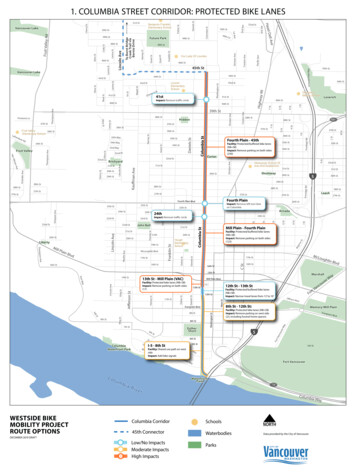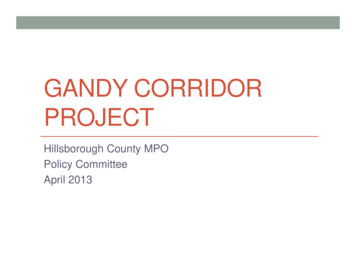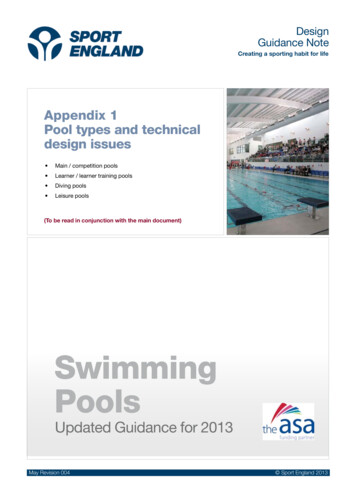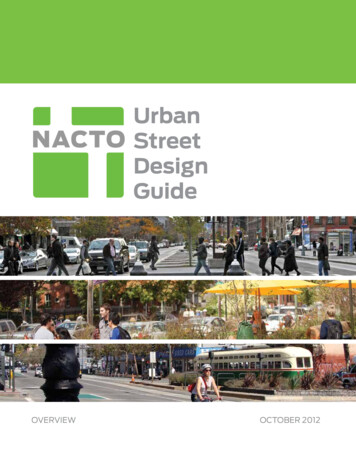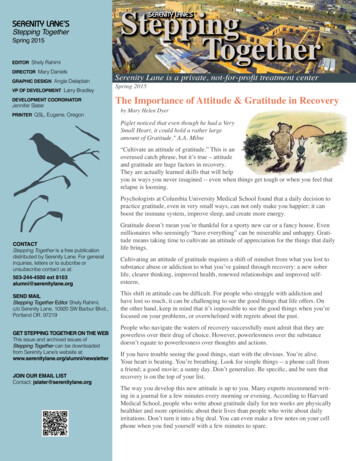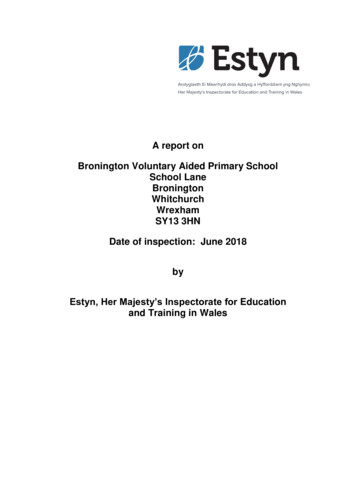
Transcription
A report onBronington Voluntary Aided Primary SchoolSchool LaneBroningtonWhitchurchWrexhamSY13 3HNDate of inspection: June 2018byEstyn, Her Majesty’s Inspectorate for Educationand Training in Wales
A report on Bronington Voluntary Aided Primary SchoolJune 2018About Bronington Voluntary Aided Primary SchoolBronington Church in Wales Voluntary Aided Primary School is situated on theoutskirts of Wrexham, near to Whitchurch, in Wrexham local authority. There arecurrently 98 pupils on roll between 3 to 11 years old, organised into four mixed-agedclasses.No pupils speak Welsh at home. Around 3% of the school’s pupils are eligible forfree school meals, which is well below the national average of 19%. The schoolidentifies 15% of pupils as having additional learning needs, which is lower than thenational average of 21%.The headteacher has been in post since September 2013. Estyn last inspected theschool in January 2012.Further information is available from the Welsh Government My Local School website at the link hoolSearch?lang en1
A report on Bronington Voluntary Aided Primary SchoolJune 2018SummaryDuring their time at the school, most pupils make good progress from their startingpoints and develop well as independent learners. They participate enthusiastically intheir learning, express their ideas clearly and discuss their work confidently withvisitors. Teachers provide stimulating experiences that engage most pupils’ interesteffectively. Pupils contribute well to decisions about how and what they learn andshow a particularly caring attitude to their peers.The headteacher has a clear vision for the school and is supported well by the seniorleader. Staff work together as a team effectively to improve pupils’ standards and theschool has a proven track record of bringing about improvements. By the end ofYear 6, most pupils are capable mathematicians and confidently write at length. Thegoverning body supports the school successfully.Inspection areaJudgementStandardsGoodWellbeing and attitudes to learningGoodTeaching and learning experiencesGoodCare, support and guidanceGoodLeadership and managementGood2
A report on Bronington Voluntary Aided Primary SchoolJune 2018RecommendationsR1 Strengthen and refine the process of planning for improvementR2 Raise pupils’ standards in ICTR3 Ensure that teachers' planning enables pupils to develop their numeracy skillsprogressively across the curriculumWhat happens nextThe school will draw up an action plan to address the recommendations from theinspection.3
A report on Bronington Voluntary Aided Primary SchoolJune 2018Main findingsStandards: GoodMost pupils enter the school with literacy and numeracy skills at or above a levelexpected for their age. During their time at the school most pupils, including thosethat are more able, progress well and achieve good standards in nearly all aspects oftheir learning. Pupils who have additional learning needs make appropriate progresstowards their individual targets.Nearly all pupils listen attentively to adults and their peers, and follow instructionswell. They develop strong oracy skills that support them well in all areas of learning,and are confident to share their ideas and thoughts. Many older pupils use anextended range of vocabulary and present their views in an engaging manner whentalking about their work or their favourite subjects.Nearly all pupils develop well as readers and show real enjoyment in reading, proudlyreading their written work aloud. In the foundation phase, many pupils use theirknowledge of letters and sounds well to read simple texts and to decode unfamiliarwords. Older key stage 2 pupils use their higher order reading skills, such asskimming and scanning, to find information quickly as part of their topic work. Manyinfer and deduce meaning when reading a story extract to describe the personality ofa character.Across the school, most pupils develop their writing skills well and confidently write atlength for a wide range of purposes across the curriculum. However, on occasionswhen writing independently, a notable minority of pupils struggle to present their workneatly or to use punctuation accurately. In Year 2, many pupils use a wide range ofvocabulary to make their writing interesting when producing poems on animals. Inkey stage 2, most pupils write confidently and improve their work through redrafting.The quality of the language used by many key stage 2 pupils in their extended writingengages the reader well, for example when writing about the monster under the bedand describing life in Roman times.Most pupils develop a solid knowledge of mathematical concepts and are confidentmathematicians by the time they reach Year 6. Across the school, most pupils useeffective strategies to solve problems. They calculate and explain the reasoningbehind their answers quickly. Older foundation phase pupils work out the possiblecolour combinations of beans, linked to the story of Jack and the Beanstalkaccurately. Many younger pupils count successfully to 10 and beyond and writesimple number sentences using addition. By Year 2, most pupils use their measuringskills well to calculate the perimeter of animal enclosures as part of their topic work.In key stage 2, most pupils develop a strong understanding of number values andapply a wide range of strategies to solve problems confidently. Most Year 3 andYear 4 pupils work out how many different sized tiles are needed for a Victorian flooraccurately. Many key stage 2 pupils use formal calculation strategies well. Olderpupils are able to check their answers and explain their reasoning clearly whenworking out the differing weights of specific ingredients needed to make a potion totreat gout as part of their work on the Tudors. However, in general, pupils do notapply their numeracy skills well enough across the curriculum.4
A report on Bronington Voluntary Aided Primary SchoolJune 2018Across the school, many pupils develop appropriate skills in information andcommunication technology (ICT). Pupils in the foundation phase log onto Hwb toaccess a range of applications with confidence to support their learning inmathematics and spelling. Most pupils in key stage 2 develop their internet researchskills well and present the information suitably. Oder pupils choose appropriate ICTsoftware to make a presentation on plastic pollution in the sea and to make a shortanimated film clip linked to their lessons. However, pupils' knowledge andunderstanding of using spreadsheets and databases are less well developed.Most pupils make good progress in developing their skills in Welsh and have verypositive attitudes to learning Welsh. Pupils in the foundation phase respond well to arange of instructions and can ask and answer simple questions confidently. By Year6, most pupils sustain a conversation in Welsh, extending their answersappropriately. They read simple texts with understanding and generally accuratepronunciation. Many write short paragraphs about their hobbies and holidays thatcontain suitable detail, following taught language patterns.Wellbeing and attitudes to learning: GoodNearly all pupils are confident, enthusiastic learners who enjoy their time in school.They participate fully in lessons, display positive attitudes to learning and developvaluable, independent learning skills. For example, Year 6 pupils talk passionatelyabout their topic on plastic waste in our seas and the damage this is causing to ourenvironment. Most pupils behave well in lessons and around the school and show aparticularly caring attitude towards their peers. They show high levels of respect forthe views of others and work well with a partner or as part of a group. Nearly all feelsafe in school and know how to keep safe online.Most pupils understand how to keep healthy, and they confidently talk about makinghealthy choices. However, pupils’ snacks at break times are not always healthy.The introduction of ‘fruity Fridays’ by the healthy schools’ committee is beginning topromote healthy eating successfully. Nearly all pupils enjoy playing football, runningand skipping at lunchtimes and understand the benefits of regular exercise.Nearly all pupils show enthusiasm for the opportunities to contribute to school life.The impact of their suggestions, such as the Criw Cymraeg in supporting pupils’ useof Welsh, is helping to raise standards. They take on responsibilities such as beingpart of the school, eco and healthy schools councils willingly and with pride.Most pupils persevere with tasks and confidently take on new challenges. Theyassess their own work and that of their classmates accurately. Key stage 2 pupilstalk knowledgeably about feedback on their work, and clearly value the input, and acton points identified for improvement quickly.Teaching and learning experiences: GoodOverall, the quality of teaching in the school is good. Most teachers plan stimulatingactivities that develop pupils' skills, knowledge and understanding successfully. Thisincludes beneficial trips to places linked to curriculum topics, such as the zoo.Visitors to the school further enrich pupils’ learning experiences. In key stage 2, anactor dressed as someone from Tudor times brought pupils’ history studies to life.The school enables older key stage 2 pupils to stay at an outdoor education centre,where they develop their independent learning skills effectively.5
A report on Bronington Voluntary Aided Primary SchoolJune 2018Teachers take suitable account of pupils' interests at the start of topics. Most pupilshave regular opportunities to make decisions and choices about what and how theylearn during class activities, which motivates them well. Pupils in the foundationphase have a clear input into their activities across the areas of learning. These‘rainbow challenges’ are at varying degrees of difficulty and are chosen from pupils’suggestions. When they complete the task, pupils place a wooden lollipop stick intheir named pot. This enables teachers to check pupils’ understanding quickly andfosters independent learning successfully.Teachers and other adults know pupils well and generally have high expectations forpupils' behaviour, which they manage calmly and effectively. In nearly all classes,teachers question pupils skilfully to check on their progress and to challenge them tothink more deeply. They use positive praise well to encourage pupils to persevere.Many teachers and support staff encourage pupils to extend their thinking andevaluate their own work and that of their peers constructively. This is particularlyeffective for older pupils as they think carefully about the strategies to use to take thenext step in their learning. Most teachers use assessment information well to caterfor the differing ages and abilities in their class. This supports vulnerable pupilseffectively and extends and challenges pupils that are more able successfully.Teachers and support staff work as an effective team to support pupils’ learning. Inthe foundation phase, support staff lead small group activities, both within theclassroom and in the outdoor learning areas, well. In general, teachers plan andprovide a good balance between adult-led and child-initiated learning. This supportspupils to make good progress in their independent learning.Most teachers are beginning to respond well to recent initiatives to bring about moreconsistency to aspects of teaching and learning, particularly when planning literacyacross the curriculum. However, in general, planning for pupils to apply theirnumeracy skills systematically across the curriculum is less well developed.Regular Welsh lessons across the school help pupils of all ages to understand theimportance of learning Welsh. In addition, teachers and the ‘Criw Cymraeg’ ensurethat there are enough opportunities for pupils to practise their Welsh in informalsituations around the school. This fosters pupils’ enjoyment of the languageeffectively. Staff provide a number of interesting activities to enrich pupils' knowledgeabout the culture and heritage of Wales. For example, foundation phase pupils studyWelsh saints and older key stage 2 pupils study the Welsh artists, make clay lovespoons and sew bunting as part of the school’s celebration of St David’s Day.Planning for the development of pupils’ ICT skills across the curriculum is at an earlystage of development. This limits the systematic development of pupils’ ICT skills.Care, support and guidance: GoodThe school is a happy, caring and inclusive community that places a strong emphasison fairness and the importance of honesty and equality. Pupils benefit from positiveand encouraging working relationships with staff. This helps to ensure high levels ofmutual respect and consistently good behaviour. The school provides valuableopportunities for pupils to develop their creative skills. For example, pupils work6
A report on Bronington Voluntary Aided Primary SchoolJune 2018alongside an artist to create a sculpture to enhance an outdoor area used for quietreflection.The school’s procedures for tracking and monitoring pupil progress and wellbeing arethorough and effective. They enable teachers to clearly identify the needs ofindividuals and groups of pupils at an early stage, and to put appropriate provision inplace. The school provides beneficial support in class, and where appropriate,bespoke withdrawal support for individual pupils with additional learning needs. Staffensure that this additional support is flexible and closely matched to individual pupil’sneeds. A team of committed teaching assistants provide high quality support tovulnerable pupils, ensuring they are well cared for and that they progress welltowards their targets. Individual education plans are clear and written in partnershipwith staff, parents and, where appropriate, specialist services.The school shares helpful information with parents through a range of methods suchas regular newsletters, a text-based class reward system and the school website.The school offers worthwhile evening workshops for parents on literacy andnumeracy, helping them to support their child at home successfully.The school promotes pupils understanding of how to keep themselves healthy andsafe, suitably. However, it has not made sufficient progress in addressing theunhealthy snacks that pupils eat during break times. The outside play areas are welldeveloped and include a trim trail and large areas of grass where pupils play footballand run around on at break times.The school’s arrangements for safeguarding pupils meet requirements and give nocause for concern.Leadership and management: GoodThe headteacher, staff and governors share a common sense of purpose andsucceed in creating a caring, inclusive community for pupils. Senior leaders workclosely together with a clear focus on raising standards and improving provision.Arrangements to distribute leadership responsibilities amongst the small team of staffare beginning to support school improvement successfully, for example the recentformation of subject teams. Regular, systematic monitoring by senior leadersprovides valuable information for staff on the strengths in teaching and learning andareas for improvement. The school takes good account of local and nationalpriorities, including a focus on raising standards in Welsh and developing pupils’independent learning skills. Senior leaders ensure that staff are kept well informedon day-to-day issues and the on-going work of the school. However, not all staff areclear as to their role in supporting school improvement.The governing body is very supportive of the school and well organised, and makeshighly effective use of a small number of sub committees to support its work. Theknowledge that governors gain through working on the standards committee andfinance committee enables them to challenge the school well. The involvement ofgovernors as members of the new subject teams is particularly effective in supportingthe monitoring role of the governing body. The link between pupils and the governingbody is strengthened by the attendance of pupils at governing body meetings when,for example, they wish to request funding for specific projects such as the purchaseof playground equipment.7
A report on Bronington Voluntary Aided Primary SchoolJune 2018The process of self-evaluation to support school improvement is well established.Staff use data well to identify areas where standards need to improve, for examplewhen strengthening pupils’ reasoning skills. They make good use of first-handevidence provided through lesson observations and scrutiny of pupils’ work to informareas for improvement effectively. The headteacher involves staff, governors andpupils in self-evaluation discussions successfully. She seeks the views of parentsthrough annual questionnaires and responds to their views promptly. Most recently,this has informed changes to the provision of homework and to providing parentswith more information on the curriculum through information evenings on supportingreading and mathematics. The self-evaluation report is a detailed document withstrengths and areas for development clearly identified. However, the link betweenthe outcomes of self-evaluation and planning for the school's development are notalways clear in all aspects.The school has a good track record of securing improvements. For example,standards in Welsh and mathematics have risen, and the attainment of the more ablepupils has improved. The school development plan is comprehensive and includesclear monitoring roles for governors and pupils. However, whilst it identifies the mainareas for improvement accurately, it does not always break these down well enoughinto clear, specific actions to be taken.Senior leaders ensure all staff have valuable opportunities to engage in professionaldevelopment. This effectively supports the implementation of new initiatives and theschool’s work to bring about improvement. Effective working with the cluster of localschools supports staff in developing pupils’ involvement in leading their own learning.The school deploys staff well to make best use of their experience and expertise.This is effective in supporting the teaching of music, Welsh and physical education.Teaching assistants are deployed effectively, and this enables them to provide highquality support, particularly for pupils with additional needs.The headteacher and governors work closely together and monitor spendingrigorously. They have succeeded in reducing the deficit budget significantly. Theschool accesses grant funding from a range of sources and uses this to supportvulnerable pupils well, and to enrich pupils’ learning experiences, for example thedevelopment of a wildlife and pond area and a quiet area for pupils to sit and reflect.8
A report on Bronington Voluntary Aided Primary SchoolJune 2018Copies of the reportCopies of this report are available from the school and from the Estyn website(www.estyn.gov.wales)Estyn evaluates a provider’s effectiveness using a four-point judgement scale:ExcellentVery strong, sustained performance and practiceGoodStrong features, although minor aspects may requireimprovementAdequate andStrengths outweigh weaknesses, but important aspectsneeds improvement require improvementUnsatisfactory andneeds urgentimprovementImportant weaknesses outweigh strengthsThe report was produced in accordance with Section 28 of the Education Act 2005.Every possible care has been taken to ensure that the information in this document isaccurate at the time of going to press. Any enquiries or comments regarding thisdocument/publication should be addressed to:Publication SectionEstynAnchor Court, Keen RoadCardiffCF24 5JW or by email to publications@estyn.gov.walesThis and other Estyn publications are available on our website: www.estyn.gov.wales Crown Copyright 2018: This report may be re used free of charge in any format or mediumprovided that it is re used accurately and not used in a misleading context. The material must beacknowledged as Crown copyright and the title of the report specified.Publication date: 20/08/20189
suggestions. When they complete the task, pupils place a wooden lollipop stick in their named pot. This enables teachers to check pupils' understanding quickly and fosters independent learning successfully. Teachers and other adults know pupils well and generally have high expectations for pupils' behaviour, which they manage calmly and .
